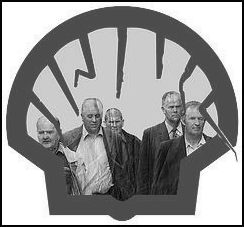Allan Armstrong reviews Two Worlds Collide – power, plunder and resistance in a divided planet by Alan McCombes

Earlier this year, Scotland hosted a series of activities in response to the G8 Summit held in Gleneagles. The key events were the official ‘Make Poverty History’ march in Edinburgh, held on July 2nd, and the G8 Alternatives ‘Stop the G8’ protest at Auchterarder, held on July 6th.
For a few days, the responsibility for organising the specifically anti-capitalist, pro-international socialist forces, drawn from Scotland, England, Wales, Ireland, the rest of Europe and the world, fell upon the SSP. Alan McCombes has written the official SSP response to this challenge – ‘Two Worlds Collide – power, plunder and resistance in a divided planet’. This pamphlet is popular in style, easy to read and has an attractive cover. By means of striking facts, statistics, quotes and analogies it makes a powerful case, both against the neoliberal policies pursued by the global corporations and against the G8 politicians at their beck and call, particularly Bush and his sidekick, Blair.
One good example of analogy:-
“The reason the rich have grown richer over the past 30 years is that they have perfected the art of exploitation. They can now move their factories like chess pieces across the map of the world, pitting country against country, continent against continent.
It works on the same principle as a reality TV game show, where the contestants humiliate themselves to win the prize, perhaps by eating a live rat or pulling out their own teeth. Except that, in the global marketplace for cheap labour, it’s not individuals but national states which degrade themselves by offering the lowest wages, the most draconian anti-union laws, and the most minimal health, safety and environmental standards” (p. 18-9).
After his recent visit to China, you can just see Blair relishing the prospect of telling workers over here, that we (not him, of course) will have to compete with conditions over there to survive in the new global market.
A good example of Alan’s use of quotes is that taken from Guardian journalist, Oliver Burkeman:-
“When I was visiting the Ivory Coast I discovered that since they’d introduced fees for high school education, more and more young girls were turning to occasional prostitution… this caused the AIDS rate to skyrocket in the principal towns of the country” (p. 30).
This cuts right through Blair’s and Brown’s favoured method for ‘solving’ Africa’s ‘debt problem’ – aid tied to the IMF’s Structural Adjustment Programmes. These decimate a country’s public services whilst handing over its assets to the greedy global corporations.
Written in a hurry
Alan’s pamphlet was written in a hurry to meet an immediate need and to be as up-to-date as possible at the time of publication. This has allowed a few errors to creep in, including the claim that the Hudson’s Bay Company controlled an area covering one third of the earth’s surface (big, yes, but not quite that big) (p. 20); that the Chinese Empire stretched from the Pacific to the Mediterranean (possibly, the short-lived Mongol Empire was intended here) (p. 20); whilst the USA apparently only had 31 thousand people in 1865 (surely 31 million) (p. 59).
However surprisingly, given Alan’s penchant for bold analogies, there are a number of cases where he understates his case. Writing of the Gleneagles Summit, he claims, Outside of Peterhead Prison, it’s not often that so many high ranking criminals can be found gathered together under one roof
(p. 27). How about, Inside or outside of Peterhead Prison…
!
Alan also calls the current US Republican Party membership of the Project for a New American Century the Genghis Khans of the 21st century
(p. 9). Now old Genghis may have been brutal, but at least he offered the leaders of an enemy city the chance to surrender, as an alternative to being attacked and sacked. This option was not given to Iraq. Saddam was told to destroy weapons of mass destruction he did not have, to ensure that ‘Shock and Awe’ could take place anyhow!
And Alan almost has us shedding a tear for the corporate executives and directors, who like football managers, if they fail to deliver, then come the end of the financial season, they’re thrown onto the scrap heap
(p. 38). Well not quite – usually they get massive pre-arranged pay-offs, even if they have failed. Then they often re-emerge to head another company!
Alan’s brief excursion through capitalist history, in Chapter 2, ‘Footloose and Free‘, emphasises the importance of Marx and Engels’ contribution to the analysis of global capitalism in ‘The Communist Manifesto‘ (recognised even by famous billionaire currency speculator, George Soros) and their role in founding the first ever global anti-capitalist organisation, the First International
(p. 23). If Alan underplays (but does not ignore) the brutality of capitalism’s early phase of primitive accumulation, particularly in the Americas with their Native American genocides, and Africa with its slave trade; then he does not hesitate to ‘call a spade a spade’, or the current globalisation project – imperialism
(p. 24).
Alan also correctly locates the origins of the current phase of anti-imperialist resistance in the Zapatista Revolt in Mexico of 1994; however significant the later anti-globalisation protest in the imperialist heartland of Seattle (home to Microsoft, Boeing, Amazon.com and Starbucks) in 1999. Alan does not see Scotland, nor even Europe, as the epicentre of anti-capitalist resistance, but highlights the role of revolts in Cuba, Chiapas and Venezuela
(p. 49). This is important when it comes to building the SSP on a Scottish internationalist and not a Scottish nationalist basis.
However, there remains a weakness in Alan’s analysis, which could still feed into a more nationalist strategy for the SSP. It is significant that Alan writes about an Anglo-British state
(p. 47) and Anglo-American imperialism
(p. 55). There is an element of denial going on here over Scotland’s contribution to the creation of the British state – particularly in Ulster. Scotland also shared in the promotion of British imperialism, in the form of major companies – James Finlay, Coats Paton, Jardine Mathieson – and by providing colonial governors, military leaders, missionaries and yes, slavers too.
Ironically, elsewhere Alan acknowledges the historic role played by Scotland in the imperial conquest and subjugation of millions on behalf of the British ruling classes
(p. 51). Alan goes on to emphasise Scotland’s military role. In the 21st century, young Scottish soldiers from Scotland’s most impoverished communities are once again killing and dying in foreign lands
(p. 51). Here, the positive effect of the current international anti-war movement pushes Alan towards a better understanding. However, some further examples of Scotland’s multi-facetted role in helping to build and maintain the British Empire would have highlighted just who our domestic enemies are; and the untenability of denying a Scottish component to Britishness, the UK state or the British Empire.
Taking this unpleasant reality on board would only give succour to British unionists (Scottish as well as English!) if you adopt a narrow nationalist perspective:- Scotland = all good; England = all bad. Socialists, particularly those taking inspiration from Marx and Lenin, highlight the class-divided nature of all nations, leading to fundamentally opposed political legacies. In Scotland we have had both the British monarchist, unionist (whether Jacobite or Hanoverian) and imperial tradition on the one hand; and the Scottish republican, anti-imperial tradition of the radical wing of the Covenanters, the United Scotsmen, the Land Leagues and John Maclean, on the other.
However, this is not just an issue of past history. Whatever some (increasingly marginalised) members of the SNP may think, their party is no opponent of globalisation, nor even of British imperialism. The SNP looks forward to Scotland winning its place in the ‘new world order’ as a tax-haven for the global corporations. The SNP campaigns vigorously for the retention of Scottish regiments which have served British imperialism well from Culloden to Crossmaglen and from Bombay to Basra.
In recent years there have been increasing demands that the SNP drop their opposition to Scotland’s membership of NATO. Alex Salmond can still (just) keep this off their Annual Conference order paper. This is because of the threat to the SNP’s left flank represented by the SSP. However, if significant US corporate forces were to give their backing to Scottish independence, in return for special favoured status here, then the SNP leadership would ditch its anti-NATO policy, as quickly as Bertie Ahern has ditched Ireland’s traditional neutrality policy.
Where were the SNP MSP’s when our 4 SSP MSPs protested in the Scottish Parliament on June 30th over Bush and Blair usurping its previously agreed policy to uphold the right to peaceful protest at Gleneagles? They fell over themselves to vote for the punitive measures rushed through by the New Labour/Lib-Dem Executive. This spineless body was having its strings pulled by the White House and Downing Street and by the CIA/Pentagon and New Scotland Yard! Any illusions Alan may have of a gradual step-by-step approach to an ‘independent socialist Scotland’, first as junior partner to the SNP – increased devolutionary powers, followed by ‘independence under the Crown’, opening the way to the socialist republic – should hopefully be dispelled after their dismal performance in defending Scotland’s limited autonomy on that day.
Neither has Alan got to grips with US/UK imperialism’s, nor the global corporations’ wider plans involving Scotland. He points out that.
“big business… is fanatically pro-union. At the time of the devolution referendum, the CBI polled the directors of the top industrial companies operating in Scotland. Of these, 80% were opposed to any measure of devolution. Over 90% were opposed to tax-varying powers. Almost all were opposed to independence” (p. 55).
Alan uses this evidence to argue that being pro-devolution or pro-independence is an obviously left wing, and hence a socialist stance. Now, if company directors were polled on their attitude towards trade unions, the findings would probably be just as negative. But company directors have learned to live with trade unions too and to devise methods to bend them to their will in ‘social partnership’ deals. Similarly, most have the intelligence to see that devolution was a necessary step to preserve the Union, in the political circumstances of the time.

The majority of the ruling class (and its press) clearly gave its backing to Tony Blair and New Labour in 1997, knowing full well that the party was committed to a ‘devolution-all-round’ settlement for these islands. Devolution, like federalism and ‘independence’ under the Crown, is just another Unionist policy option. Those ultra-Unionist Tories, who launched their ‘Just Think Twice’, ‘Vote No’ campaign, were completely outgunned and out-financed by New Labour’s ‘Scotland Forward’, ‘Vote Yes’ campaign – something that would not have happened if the British ruling class really opposed devolution.
New Labour’s ‘devolution-all-round’ policy – for Northern Ireland, Scotland and Wales – represents the culmination of a developing New Unionist strategy. It was devised by the British ruling class to deal with the challenge of national democratic movements in the UK. This strategy was initially forged, on a more limited front, by the Tories, with their Downing Street Agreement. Quite clearly, after decades of resistance, first from the Civil Rights Movement and later, from the Republican Movement, Northern Ireland could no longer be run as an old-style Ulster Unionist sectarian fiefdom. Neither, after the rise in national democratic sentiment, following the Tories’ imposition of the poll-tax, could Scotland be run solely by administrative devolution.
New Labour appreciated the need for a comprehensive policy to bring about a wider political stability covering the whole of these islands. Through a ‘devolution-all-round’ political settlement New Unionism hopes to provide the economic environment for the global corporations to maximise their profits, particularly through the policies of deregulation and privatisation. Furthermore, New Unionism seeks to incorporate the Irish government as a junior partner in its plans. It also seeks the cooperation of trade union leaders in ‘social partnerships’ – a policy pioneered by an Irish Fianna Fail government.
This New Unionist strategy is also fully backed by the US government, both under Clinton and Bush. The UK state has been awarded the US and global corporate license for the North East Atlantic region. British imperialism is seen as a wholly reliable junior partner for US imperialism. US and UK imperialism have an agreed military policy too. George Robertson, former Labour War Minister, now heads NATO. The New Labour/Lib-Dem Scottish Executive happily give their consent to the use of Faslane, Kinloss and Leuchars for imperialism’s continued wars – although the British state is careful to ensure that the Scottish Executive has no real jurisdiction over such matters. These are reserved under the Crown Powers.
Meanwhile, the Irish government quietly sanctions US use of Shannon Airport for imperial use; just as any future SNP-led Scottish Executive or ‘independent’ Scotland would surely accept NATO use of military bases here.
A full appreciation of US/UK imperialism’s wider political plans for these islands would have widened the appeal of Alan’s pamphlet. For, if the ruling class has a unified New Unionist strategy for these islands, then we too must look to an ‘internationalism from below’ strategy, which unites socialists in Scotland, England, Wales and Ireland to counter their plans. When Alan argues that Scottish independence {and} the break-up of the British state would deliver a body blow to Anglo-American imperialism
, he fails to recognise that US/UK imperialism can further develop its strategy to encompass formal Scottish independence – even if reluctantly, as they did over devolution. The UK state would, however, want to retain the Crown Powers to safeguard British imperialism’s vital interests – and there is every indication that the SNP would be happy to accommodate this.
This is why the SSP must launch a republican and internationalist campaign which opposes the Union and its Crown Powers and which seeks allies elsewhere in these islands. Has New Unionism brought peace and prosperity to Northern Ireland? No – it has brought the deeply reactionary Paisley to the fore, entrenched sectarian divisions and led to stepped-up loyalist attacks on nationalists and ethnic minorities. Has the Celtic Tiger economy brought prosperity to the 26 Counties? – well, not if you are a worker or small farmer. Meanwhile, the ‘Rossport Five’ have been jailed by the Irish courts with the full backing of the Irish government, for opposing Shell’s plans to build a new oil pipeline through Mayo.

There is no shortage of potential allies for an ‘internationalism-from-below’ strategy. We need this to oppose their New Unionist alliance – New Labour, Fianna Fail, the trade union leaders – and, pulling the strings behind the scenes, such global corporations as Shell. Our political answer to their ‘devolution-all-round’ now, or their ‘independence under the Crown’ in the future, is the break-up of the UK state through the setting up of democratic republics in Scotland, Wales, England and a united Ireland.
Alan wants the SSP to claim the legacy of the legendary Clydeside socialist, John Maclean
(p.54). It is worth remembering that when Maclean eventually arrived at a strategy to break up both the British state and empire, he adopted the Workers’ Republicanism of that legendary, Edinburgh-born socialist, James Connolly. Connolly had to oppose the milk-and-water nationalists of his day – the Irish Parliamentary Party – the political equivalent of today’s SNP. They capitulated before British imperialism in the First World War. The SNP court global corporations now, and will bow before NATO before too long.
Here two words collide – nationalism and republicanism. There should be no confusion in the mind of the SSP over which side we take. Alan’s pamphlet takes us boldly on the first steps along the anti-capitalist road, but provides no clear signposts when we meet this political forking of the ways.
